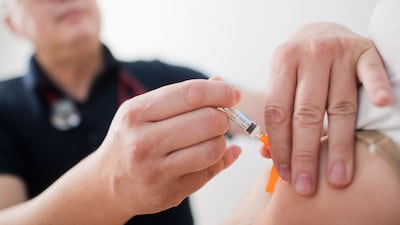A polio vaccine booster campaign is being launched in London targeting young children as the disease threatens to make a comeback.
British health officials confirmed on Wednesday that the virus is spreading in the capital for the first time since the 1980s.
Polio, which was officially eradicated in the UK in 2003, can cause paralysis in rare cases and can be life-threatening.
The UK Health Security Agency (HSA) identified 116 polioviruses from 19 sewage samples this year in London, after first sending out an alert in June about finding the virus.
The levels of poliovirus found and genetic diversity indicated transmission was taking place in several London boroughs, the agency said.
No cases have yet been identified, but the vaccine booster campaign is being launched in an attempt to get ahead of a potential outbreak.
"No cases of polio have been reported and for the majority of the population, who are fully vaccinated, the risk is low," said UK HSA consultant epidemiologist Dr Vanessa Saliba.
"But we know the areas in London where the poliovirus is being transmitted have some of the lowest vaccination rates.
"This is why the virus is spreading in these communities and puts those residents not fully vaccinated at greater risk.
"Polio is a serious infection that can cause paralysis but nationally the overall risk is considered low because most people are protected by vaccination," Dr Saliba said.
"The last case of polio in the UK was in 1984, but decades ago before we introduced the polio vaccination programme about 8,000 people would develop paralysis every year.
"It is vital parents ensure their children are fully vaccinated for their age."
'Silent transmission' of polio
Almost one million children aged one to nine across London will be offered a polio vaccine.
Health officials said there has been “some transmission” of the virus in the capital after detecting poliovirus in sewage samples.
The poliovirus was first detected earlier this year at Beckton sewage treatment works in east London.
Officials said levels of the virus found in sewage suggests "some virus transmission" in boroughs including Barnet, Brent, Camden, Enfield, Hackney, Haringey, Islington and Waltham Forest.
GPs will invite children for the booster vaccines alongside a wider catch-up campaign already announced.
Immunisation rates across London vary, but are on average below the 95 per cent coverage rate the World Health Organisation suggests is needed to keep polio under control.
Youngsters can be responsible for “silent transmission” of polio, which means that they may have the virus but not show any symptoms.
Children will be offered a catch-up vaccine or booster jab within the next four weeks with officials hoping to vaccinate all those invited within six weeks.
Officials hope the campaign will boost antibodies and interrupt transmission of the virus.
The programme will start in the areas where the virus has been detected in sewage and then be extended across all London boroughs.
The virus has not yet been found outside London but officials are stepping up surveillance in the rest of the country.










